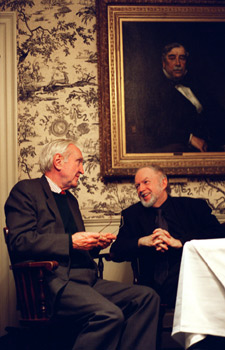A knight’s errand:
Sir Crispin Tickell addresses students on dangers facing environment

According to Sir Crispin Tickell, the longtime British diplomat and leader in the debate on global climate change, there is indeed “something new under the sun.” Human activity is changing the natural environment in unprecedented, profound, and dangerous ways. If our species and millions of others are to survive, Tickell says, we must drastically change our approach to our ecosystem.
Tickell, a Resident Fellow at Harvard’s Center for the Environment, put these assertions to the students in Timothy Weiskel’s “Environmental Ethics” class. Harvard’s Working Group on Environmental Justice, which Weiskel co-directs, sponsored the guest lecture and a reception for Tickell.
Tickell said that we are entering a new epoch in nature – the “Anthropocene” – an age in which humans themselves are the modifying force on the environment in the way that natural phenomena were in the past. The multiplication of the human species, for instance, has reached crisis proportions and threatens to tax the resources of the Earth beyond its carrying capacity. He cited the fact that the world’s population had tripled from 2 billion to 6 billion in his lifetime alone.
“If it were spiders or caterpillars or butterflies, we would be horrified at that rate of multiplication,” he said.
Tickell cautioned that humanity’s ecological footprint – the amount of natural resources consumed by a community relative to its actual size – was unsustainable, with fully half the human species projected to live in cities in the next five or six years.
“It is said that in London, we have an ecological footprint 112 times the size [of the actual city],” he said.
Tickell ticked through a list of major environmental concerns: There is less land for people to live on, he said, and the land that exists is becoming degraded. How we dispose of waste is one of the most pressing issues facing humanity. We are using more water than ever before and oceans and rivers are polluted. Our climate is changing rapidly, putting the Earth in jeopardy of both massive warming and a new ice age. Citing Harvard evolutionary biologist E.O. Wilson, Tickell asserted that human kind is now destroying other forms of life at the same rate as the great extinctions of 250 million years ago, 75 million years ago, and 2 million years ago.
“We don’t actually know what we’re doing,” he said. “If you take the line of a food chain or an ecosystem, there is some vital element in it. If you destroy some part of that, the whole thing will collapse.”
Tickell attributed much of the growing environmental crisis to Western culture, which dictates that “we should all get wealthier. We should consume more.” In our culture, Tickell said, the priority is how to improve the material living standards of human beings, rather than the betterment of the ecosystem as a whole.
To combat these messages, Tickell said humanity needs to get a new appreciation for the fragility of life on Earth and our place in it.
“If you can think of the Earth as a kind of apple,” he said, again paraphrasing E.O. Wilson, “the living membrane, the living part of it is very, very vulnerable. … It’s a big rock with a thin living membrane and then space.”
To emerge from the burgeoning environmental crisis, Tickell said that humans must come up with a new sort of economics that takes environmental costs into consideration.
“The economy is a wholly owned subsidiary of the environment,” he said. “Communism collapsed because it didn’t recognize markets. Capitalism may collapse because it doesn’t recognize ecology.”
Tickell also discussed the moral dimensions of environmentalism and urged students to subscribe to a new ethical system that values life, including “all the things inside us and outside us.” As stewards of the Earth, he rated humans one notch below the prehistoric trilobites and cautioned that we, too, are in danger of sharing that species’ fate.
Tickell ended, though, on a positive note, quoting a poem by Hildegaard of Bingham, a 12th century abbess:
I ignite the beauty of the plains
I sparkle the waters
I burn in the sun and the moon and the stars
I adorn all the Earth
I am the breeze which nurtures all things green
I am the rain coming from the dew that causes the grasses to laugh with the joy of life.
“We should have the sense of the wonders of nature,” he said, “and our ability to laugh in the joy of life.”




